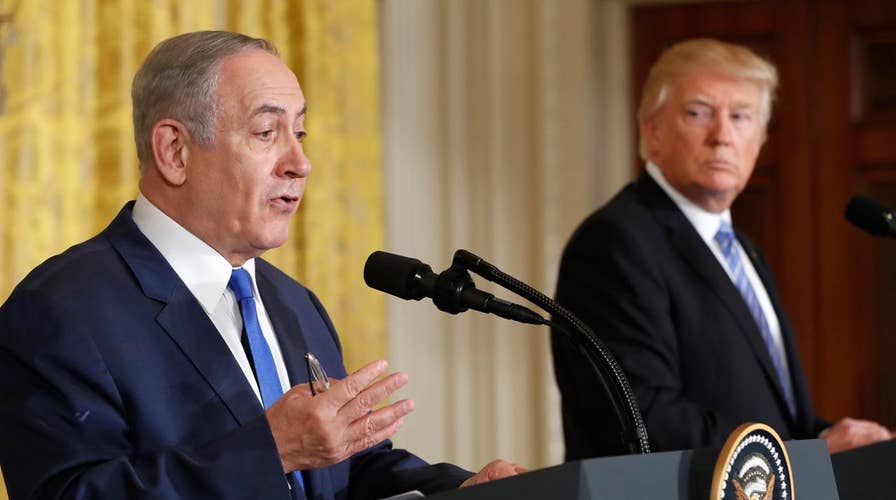Is Trump keeping 'two-state' plan in talks with Netanyahu?
Strategy Room: Joe Lestingi and Robert O'Brien on talks between the US and Israel
President Trump touted the prospects for a “great peace deal” in the Middle East while meeting Wednesday with Israeli Prime Minister Benjamin Netanyahu, as both leaders sought to reaffirm their countries’ alliance and turn the page on years of tensions between the Israeli leader and Trump’s predecessor.
The U.S. president, starting early on the negotiations, also used a joint press conference to publicly prod Netanyahu on the sensitive issue of Israeli settlement-building.
“I’d like to see you hold back on settlements for a little bit,” Trump said, standing beside Netanyahu at the White House.
Minutes later, Netanyahu gently pushed back, saying he doesn’t consider settlements at the “core of the conflict” and they would discuss the matter so as not to keep “bumping into each other.”
It was Trump’s first taste of the tricky geopolitics ahead. In seeking a Middle East peace accord, Trump is going down a road virtually every modern president has traveled, only to be snarled in the end by the complicated regional political and security interests that for decades have kept such a deal out of reach.
But Trump, who throughout his career has burnished the image of a master negotiator, sounded an optimistic note, citing his own personal relationship with his Israeli counterpart.
“Bibi and I have known each other a long time … and I think we’re going to make a deal,” Trump said.
After Trump joked about Netanyahu’s apparent skepticism, the Israeli leader quipped: “That’s the art of the deal.”
Trump said in his opening remarks that the U.S. will encourage a “great peace deal” between the Israelis and Palestinians, adding: “It is the parties themselves who must directly negotiate such an agreement.” He reaffirmed the “unbreakable bond” with Israel and added, “As with any successful deal, both sides will have to make compromises.”
The biggest question of the visit, though, pertains to whether the White House will continue to press for a two-state solution. Ahead of the meeting, a senior White House official made waves by suggesting peace between the Israelis and Palestinians may not come in the form of a two-state solution -- a position that could represent a dramatic shift from 20 years of U.S. policy.
Asked about the U.S. stance at the press conference, Trump left it open. He said he’s “very happy with the one that both parties like.” He said he thinks a two-state solution could be easier, but he can live with either option.
His central message was that the Israelis and Palestinians must directly negotiate an agreement. But on a point sure to please the Netanyahu government, Trump said that his administration would “love” to move the U.S. embassy from Tel Aviv to Jerusalem.
“We’re looking at it very, very strongly,” he said.
Doing so would signal U.S. recognition of Jerusalem as Israel's capital, a move that would infuriate Palestinians. They claim the eastern sector of the city, captured by Israel in the 1967 war, as their capital.
The two leaders addressed the press ahead of a private meeting in the Oval Office, where everything from the Middle East peace process to settlements to the Iran nuclear deal were likely to be on the table.
The meeting was an opportunity for the U.S. and Israel to hit reset on their alliance, after tensions between Netanyahu and former President Barack Obama – who, despite those tensions, often stressed that the U.S.-Israel bond is unbreakable.
During his final White House news conference, Obama had warned that the moment for a two-state solution "may be passing" and said the "status quo is unsustainable."
For decades, the U.S. position has been that Israelis and Palestinians must work through direct negotiations to establish two states living side by side, at peace, with Palestinians to ultimately create an independent state. State Department officials expressed surprise at the White House official's comments and said Tuesday they were not aware of any policy shift on the desirability of a two-state solution.
Meanwhile, two senior Palestinian officials say CIA chief Mike Pompeo secretly held talks in the West Bank with Mahmoud Abbas, the first high-level meeting between the Palestinian leader and a Trump administration official. They said Wednesday the meeting took place Tuesday at Abbas' headquarters in Ramallah.
After Wednesday’s meeting with Trump, the Israeli prime minister was heading to Capitol Hill for meetings with lawmakers on both sides of the aisle, including Senate Majority Leader Mitch McConnell, House Speaker Paul Ryan and Senate Minority Leader Chuck Schumer.
Trump, who said during his campaign that he'd love the challenge of negotiating a Mideast agreement, has appointed his son-in-law, Jared Kushner, to lead the effort.
The Associated Press contributed to this report.





